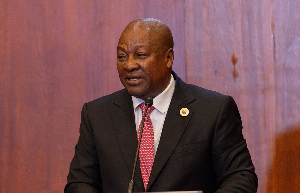Plans of the government to issue zero-coupon bonds where there will be no payment of interest until maturity is an indication that the country’s finances is currently going through desperation, a financial analyst with Dalex Finance Mr Joe Jackson has said.
In a tweet, he said “Ghana plans to issue Zero-coupon bonds where we pay no interest until maturity. Bonds mature in 4 short years. This is further evidence of the desperate state of our finances. We need to ‘Share the burden’ by taxing the wealthy. #TaxTheRich.”
In its latest attempt to use non-conventional means to ease its dire fiscal predicament, Ghana` is attempting to issue zero-coupon bonds for the first time. This involves issuing bonds on which no interest will be paid until the bond mature – in Ghana’s proposal, after four years.
It is still unclear whether the interest will be lumped front end (in which case the total interest would be deducted from the principal amount to be lent, and the full amount would be repaid to investors upon maturity) or whether it will be paid back-end (whereby the full principal amount would be provided at the time of issuance and the full amount of accrued interest would be added to this and paid to investors at maturity). However considering the sheer amount of interest to be paid over four years – even at seven percent per annum this would still be equivalent to 28 percent of the principal to be borrowed, it is likely that government would insist on the interest to accumulate and be paid back end, upon maturity. Indeed, front-ended interest payment would make the issuance less advantageous to Ghana than a conventional bond issuance where interest is paid annually or semi-annually.
Government’s proposal to issue zero-coupon bonds is thus an effort to avoid paying interest on the bonds during its lifespan. Interestingly the proposed tenor is four years just long enough for the huge one –time payment of principal and accumulated, compounded interest to become the obligation of the administration that succeeds this one which will use the money.
This will generate considerable controversy. The use of back-ended zero-coupon bonds would improve the country’s cash flow by enabling it borrow over the medium term without having to meet debt servicing costs of paying interest every year – debt servicing costs have been rising to inordinate levels and this year will take away 49.5 percent of the country’s expected tax revenues – but would leave the next administration, which will succeed this one with a huge debt servicing bill to meet almost immediately it assumes office, comprising the principal amount being borrowed now and the interest accumulated over four years. Indeed, if Parliament had not already approved the planned bond issuance already, government would have found it very difficult, if not altogether impossible to secure legislative approval for issuing the zero bonds it intends, especially without having a clear majority in the house.
Even with approval already secured, the intended issuance will generate controversy among parliamentarians politicians, public policy analysts and commentators as well as economists who will question the fairness of leaving the next administration with such a debt servicing bill so early in its tenure. The payment will obviously have to be refinanced rather than paid from the treasury, but the timing will leave the new government with very little time to arrange it, especially if the next government is formed by a party currently in opposition.
On the other hand, though, the arrangement is perfectly suited to the incumbent government which effectively will be borrowing without any debt servicing obligations accompanying it while still in office. Considering that debt servicing already is taking half of its tax revenues this will be crucial towards its plans for fiscal consolidation to bring the fiscal deficit back under 5.0 percent as demanded by the currently suspended fiscal responsibility law, by 2024.
The incumbent government’s supporters will argue that the use of zero-coupon bonds is not unfair since its inordinate debt servicing costs have been imposed on it by previous administrations – in effect, it would be doing to its successors the same thing as its predecessors did to it.
Actually, it will not be an easy sell to the international investment community. With Ghana’s public debt to Gross Domestic Product ratio already well above the generally accepted debt sustainability threshold of 70 percent (it was 76.1 percent by the end of 2020) and the World Bank projecting it to rise to over 80 percent by 2023, even recovering the principal amount lent will be seen as risky; zero-coupon bonds put the interest at risk too, since by the time it falls due for payment Ghana might be having difficulties meeting its debt servicing obligations unless its debt trajectory changes from its current course.
Basically, government will have to convince investors that by the time payments fall due, new sources of foreign exchange revenues would have become available to it – most practically from the development of either the impending Pecan oilfield by Aker or the Afina oilfield by Springfield and partners.
Business News of Monday, 29 March 2021
Source: 3news.com













